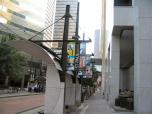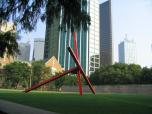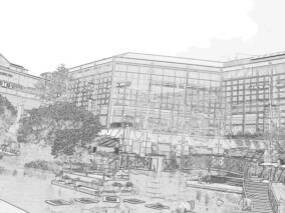




Oftentimes in cities we are talking about building, expanding, redeveloping, restricting and controlling as well as a number of other descriptive terms. We don’t always like to discuss rebuilding or fixing. However, in every city this is an endeavor that must be undertaken from time to time. Natural disasters are one phenomenon that societies always have to deal with and work to restore things back to where they were in the idyllic stage before the disaster occurred. If conditions were not so idyllic before, the opportunity exists to improve upon the past. I heard a report on the radio this week that the homes that were destroyed at Possum Kingdom Lake during last year’s wildfires are being rebuilt at an average of sixty-six percent larger size than they were before the fire. It will be interesting to see the rebuilding process in areas of Arlington, Lancaster and Forney which were particularly hard hit from the April 3 tornadoes that went through the Dallas-Fort Worth area.
When the storms subsided a few weeks ago, I saw the tears of the helpless people on television and internet talking about not knowing where they would go or what they would do now that their homes and belongings were destroyed. The Dallas Morning News website listed contact information for relief agencies for the benefit of those needing assistance and those desiring to provide it. Governor Perry traveled through the areas hit a couple of days after the storm and asked the federal government for disaster declarations for the areas affected.
After April 3, news was full of images of needy residents who had lost everything they had. When well meaning good Samaritans were unable to get past police barricades around the hardest hit communities, in order to offer water, food and other assistance, it got me to considering the following: what is really the best way for a community to heal and rebuild after a disaster and to what degree should the assistance be centralized under government control verses a decentralized neighbor helping neighbor approach? We all remember Hurricane Katrina and the terrible devastation wreaked upon New Orleans. Does the same approach that was applied in New Orleans fit every hurricane, tornado, flood or other disaster? How do you disincentivize the rank opportunists who travel from disaster to disaster? What does one do to keep from becoming a victim of the unscrupulous among us and get one’s life and sanity back to some sort of normalcy in very short order?
I called my Allstate insurance agent and went in and spoke with him one day to get his perspectives on these matters.
One thing that we discussed related to the items that a homeowner may not be aware of that can cause them more headache. Be careful with the money you are entitled to receive. If a homeowner has a catastrophic loss under $10,000, then the insurance company can write the check out directly to them and not the lender on the home. If the lender contacts the homeowner demanding that he sign the check over to them he needs to know that they are not entitled to that money. The homeowner then may need to contact his insurance company who would get their catastrophic people to contact the lender or other appropriate party. Also if the insurance company writes a check for partial payment to you for your damages on your property, remember that they frequently have a time period in which you must complete the repairs in order to receive the remainder of the funds. Don’t disregard the deadline.
Homeowners should be very mindful of the contractors who they engage to provide repairs on their home. They need to be careful to only contract with established contractors who are bonded, certified, insured, and have been in business for quite a while. One should not deal with roofers who are working out of the back of a truck. Remember that a roof is only as good as its installation.
Good practices that a home owner can follow so as to be ready when faced with disaster include having the name and phone number of their insurance company and agent handy in multiple locations so that if one place is destroyed, they will have the information somewhere else. Calling their insurance company is the first thing they should do. Personally, I discovered that if disaster happened to my wife’s and my home we would get an expense check several times what our needs would hopefully be to cover lodging while our home was being rebuilt. Getting at least three different contractor quotes for each portion of the home repairs is also important.
One way to protect household belongings in a home that has been damaged by a tornado or winds is to immediately set up a tarp and cover holes in the roof and ceiling in order to protect interior contents. (It might also be good to find a storage unit as soon as you can and even consider having a list of those available to call if you need one and rent a truck and put your belongings in there as soon as possible.
I asked my agent his thoughts regarding how a homeowner should respond to well meaning neighbors who want to help as well as when a Katrina type response is warranted. He responded that we live in a very generous country that has given more for relief anywhere in the world than any other country on the planet. Churches including his church in North Dallas dedicated their Easter Sunday offering for tornado relief. A number of individuals are self reliant and are capable of picking themselves up and helping their neighbors after a disaster, with limited assistance from governmental entities. Obviously if one is a homeowner he will have insurance that will hopefully cover his losses. He added that many apartment dwellers do not carry insurance and so if they are in a building damaged or destroyed by a natural disaster they will be more dependent upon federal funds for their recovery. (A note to renters, Purchase a renter’s policy from your insurance company. I carried one before I purchased my home.)
A bottom line though is if you see your neighbor in need and can provide assistance in some way, just do it.
I performed a bit of internet research after the April 3 tornadoes to see if building codes should be enhanced in “Tornado Alley” in order to protect more structures from being significantly damaged or destroyed or if my wife and I should build a home that conformed to the hurricane standards of Miami. I discovered that it might not be worth the cost for a Dallas homeowner to construct a home to withstand an EF-5 tornado if one considers that the likelihood of any particular home being struck by a tornado in the City of Dallas is once every 3,000 years. However, if it is your home that is struck, that is a different story.
Here are some websites of organizations one can contribute to that provide assistance in natural disasters.
Help in the Rubble
Posted: May 1, 2012 by Chuck DeShazo
